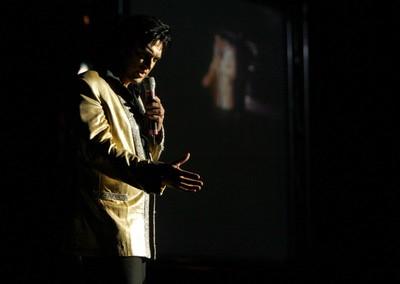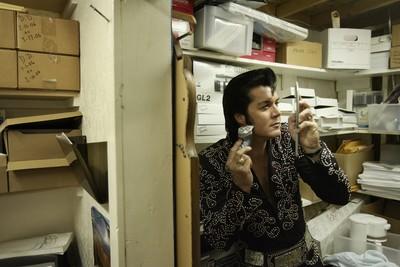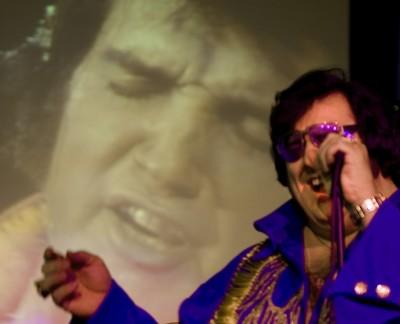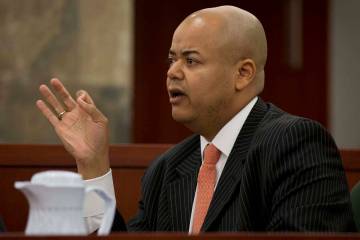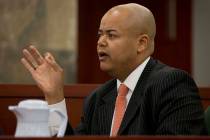ALL THE KING’S MEN
It all begins with the hips --
pneumatic, spring-loaded, suffocated
in leather -- as they trace a series of carnal arcs in
the dark showroom.
Matt Lewis twitches like a bundle of nerve endings vacuum-packed into a tight white jumpsuit, its shiny tassels flying through the air like golden shrapnel.
He swishes his pelvis as if he's dodging bullets with his waistline. He sucks in his cheeks and puffs out his lips, a glittery storm front of dramatic flourishes.
A woman down in front clutches at her chest as if someone has just torn some pricey necklace from around her throat.
Others laugh.
Lewis has that effect on people.
He's The King -- of something -- and his court is awash in beer and nostalgia, sweat and selective memories.
It's close to 9 on a Thursday night, and Lewis is closing out a "Legends in Concert" show at the Imperial Palace, approximating that curled-lipped ghost who still packs them in night after night: Elvis Presley.
Backed by a constellation of lights and dancers in short skirts that, unlike this show, leave little to the imagination, Lewis stomps and howls through a selection of Presley favorites with all the perpetual motion of a calisthenics routine.
He cracks jokes, sings from atop tables and tosses sweaty scarves to the crowd, pausing only long enough to mop down his partially exposed chest.
He's the pinup, early-'60s Elvis preserved in amber.
Shortly after the curtains come down and the lights go up, Lewis is standing outside the showroom, diligently shaking hands like a used car salesman, signing autographs and indulging the crowd's need to address him in Presley's much caricatured Southern accent.
"After the show, I get 1,500 people saying, 'Thank you very much,' " Lewis says with a chuckle, speaking in an exaggerated Elvis drawl. "It's a part of the fun, part of the game."
And it's a game that Lewis has learned how to play well. He has been doing it since he was 12 years old, since his dad painted sideburns on him for a small town festival in his native Missouri, and he has become accustomed to the pros and cons of the business.
"People will make fun of you," Lewis says between bites of shrimp at Embers steakhouse, having left his Elvis wig in the dressing room on the floor below. "There was a period of time where I thought I was really cool, and that when people were looking at me, they thought I was cool. But then I realized that I was just an Elvis impersonator. I think they probably thought I was a freak. We kind of look at people who look like that and think they're freaks."
And so it is for guys like Lewis, who make a living by being an icon to some and a punch line to others.
"At first, I was like, 'Those guys are weirdos,' " recalls Elvis impersonator Donny Edwards, a baby-faced 32-year-old who was a recent finalist on the ABC talent show "Next Best Thing." "I had the image of the stereotypes of what Elvis guys were, guys who walk around talking like Johnny Bravo, with fake hair. I just remember thinking, 'No, I could never do that. You gotta be in another world to be doing that stuff.' "
Eventually, Edwards would change his mind and join the Elvis ranks, filled as they are with dreamers and misfits, die-hards and struggling actors, true believers and the occasional opportunist.
They're black and white, male and female, fat and skinny, tall and short, preteens and 50-somethings.
There's an amputee Elvis, a mini-Elvis, a punk rock Elvis, a transgender Elvis.
They sing at weddings, jump out of airplanes, host baptisms and occasionally hawk pet food.
There are more than 30,000 of them worldwide, and the one city that they converge upon the most is Las Vegas.
After all, this is a town steeped in Elvis lore. At the former International Hotel (now Las Vegas Hilton), Presley performed a string of 837 sold-out shows beginning in 1969, and there's a bronze statue in the hotel commemorating his run.
Presley's "Viva Las Vegas" is the town's unofficial theme song, and fake Elvis sideburns remain a big seller at Bonanza Gifts, the world's largest gift shop.
"What Elvis did in 1969 was bring rock 'n' roll to Vegas, to the Strip, to the hotels. He electrified this town with his presence," says Sue Lorenz, president of the Viva Las Vegas! Elvis Fan Club. "I think it's great that Elvis' spirit continues on through these performers."
In Las Vegas, Elvis' visage will never fade, even as the 30th anniversary of his death approaches on Aug. 16. And all The King's men are here to ensure as much.
"The Elvis phenomenon is wild," Lewis says with a grin, finishing his meal before hustling off for another show. "And it's strange."
LIVING LARGE IN THE ELVIS WORLD
"There's two worlds," Eddie Powers begins, waving his big hands in the air with such force that the thick gold rings that decorate each of his fingers clink together loudly. "There's the regular world, and then there's the Elvis world."
It's little secret which realm Powers inhabits: He has sideburns thick as a wolf's hide, he drives a hot pink '56 Cadillac, and when he steps out of the hot afternoon sun and into the Las Vegas Hilton, he keeps his thick, gold-rimmed shades on.
The Hilton is hallowed ground for a guy such as Powers, and he strolls through the mammoth hotel as if he helped build it.
"Not many people know of this place," he says as he makes his way toward a small alcove next to the casino's theater, where a series of framed Elvis portraits lines the walls above chirping slot machines.
Powers recounts the history of each picture. He knows the story behind every one, and, like a kid with a hot secret, he can't wait to share the details.
"You see that black jumpsuit he's in there?" Powers says as he points to a live shot of a svelte-looking Presley playing the Hilton. "When he first returned for that performance, that whole month he was in a black one-piece jumpsuit. But then he changed to the white suit because nobody could see him and he couldn't be photographed."
With a passion for Elvis hot enough to boil water, Powers can be counted among the most ardent members of his profession: the Elvis lifer who takes his work as seriously as a surgeon grips his scalpel.
He has 20 professionally made Elvis jumpsuits, which can run from $3,000 to twice that much, and a wife who dresses as Priscilla Presley.
Hard-core types such as Powers often chafe at being labeled impersonators. They prefer to be called "Elvis tribute artists," or ETAs for short.
Some of them are prima donnas who wouldn't participate in this article unless they were the only act mentioned. Others speak as Elvis in the first person.
They come from different backgrounds.
Some of them got into Elvis as kids and have been lifelong fans.
"I was pretty obsessed with Elvis as a child," Edwards says. "I remember sitting in the car with my grandma one time and Elvis came on the radio station. My grandma reaches over to turn it off -- she thought he was the devil -- and I remember grabbing her hand and going, 'No!' She just looked at me like, 'You don't do that to me.' I was like, 'It's Elvis, Grandma.' "
Others got into the profession more as a business move because they resembled Elvis and saw that they could make a decent living mimicking him.
Brendon Paul, owner of the Graceland Wedding Chapel, was an art major at UCLA and an up-and-coming musician when a fellow student noticed he looked like Elvis and got him a gig as an impersonator.
"Some of my friends had graduated the year before with fine arts degrees, and they were delivering pizzas. I remember thinking, 'The future doesn't look bright for art majors,' " the 6-foot-4-inch Paul says, laughing from inside the chapel, which he purchased for $1 million in 2003.
"It's a job," he continues. "It's a great job, and I love it. But when it's done, it's done. You go to my house, and there's no pictures of Elvis. There's no magnets on the fridge, there's nothing. I go around looking like this most of the day, when I go home, I don't want to have anything to do with Elvis. I try to have a normal life."
MANY DECIDE, IF THE JUMPSUIT FITS, WEAR IT
Normalcy, of course, is a relative term when you dress like a dead rock star for a living.
But in many ways, portraying a guy like Elvis is an escape from the routine, a way to gain acceptance by being different.
Take Powers. As a kid growing up in a suburb of Minneapolis in the late '70s, he used to get hassled for his love of Elvis.
"I let it be known when I was in high school that I was a huge Elvis fan, and I took a lot of teasing," he says. "I was considered extremely weird for being into Elvis."
One Halloween, Powers got up the nerve to go out in public dressed like Presley for the first time, and he got hooked on the response he garnered.
Suddenly, he went from being an outcast to being noticed.
"When I started portraying him, I had no idea about the intense emotion," Powers says, moving to the edge of his seat as he speaks. "I could see all these other people who also had that intense love for Elvis. It was like I had died and gone to heaven. I could see other people who were like me."
And that's part of the natural appeal of being an ETA: the attention, the fawning, the hazy veneer of faux celebrity.
"A lot of these women who love Elvis, they don't care that you're in a homemade suit, that you've got paste-on sideburns," Powers says. "Anybody who resembles Elvis, they're coming up to him and hugging him and kissing him."
"I've been pulled off the stage before," says Johnny Thompson, a Las Vegas-based ETA who has been featured on MTV and "Entertainment Tonight" and who has toured the world as Elvis. "In China, 300 women just ran and jumped onstage, and you're like 'Whoa.' They're running at you, grabbing you."
But who are they really reaching for? The entertainer before them, or some idealized notion of a man who no one can ever truly replicate?
That's the psychological rub of the profession: Many Elvis tribute artists are skilled singers, actors and performers, but they don't get much acclaim for being themselves.
"You'd rather sing as yourself. That's the hardest thing," says Michael Conti, a veteran ETA who has had several shows on the Strip, most recently "Visions of a King" at the Riviera. "But it's easier to do Elvis than yourself."
THE KING'S WORK IS NEVER DONE
Elvis has entered the building, the staring has begun, and the tall man in the white jumpsuit smiles likes he's running for office.
As he strolls into the Golden Nugget, Jeff Stanulis gets glad-handed by one stranger after another like some long-lost relative who they've unexpectedly run into at the grocery store.
"I think you're still alive man!" A middle-age guy in a bright red T-shirt bounds up to him, chuckling to himself.
In less than an hour, Stanulis will take close to a dozen photographs with everyone from tipsy 20-somethings to middle-age housewives.
It doesn't matter that Stanulis is sitting in a bar, engaged in conversation when people come up to him: When you're Elvis, you're always on.
"I was at church, down on my knees praying, and this little old lady comes over and gives me a pat on the shoulder and goes, 'Hi Elvis,' " Stanulis says, grinning. "For myself, I would never approach somebody who's in their own space like that, but you have to put yourself in their shoes. If you see this guy walking with the black hair and the sideburns, you're going to say something."
It's a bit past 2 p.m., Stanulis already has done four weddings today, and he has another one tonight, so he's in full regalia, weathering the grind with relish.
Stanulis works seven days a week, if possible, and is always on call in case someone needs an Elvis to sing at a birthday party at 2 a.m.
"It's a 24/7 thing. Either you're working at a wedding chapel, at a convention, or you're performing for someone in their hotel room," Stanulis explains. "Somebody will give you a call, 'We need an Elvis.' 'When?' 'Right now.' So you almost feel like Superman looking for a phone booth to change in. Vegas is a very last-minute kind of town."
Considering that Elvis was the embodiment of glitz and ostentation, a man who practically bled rhinestones, it's kind of ironic that there's little glamour in portraying him for a living.
Having moved here eight years ago, Stanulis, a boyhood Elvis fan, worked a construction job to pay the bills while he got his career as an ETA off the ground. Work can be hard to find at first, and it mostly involves performing at weddings, entering contests and doing public appearances promoting everything from Elvis slot machines to dog-washing services.
With so many ETAs in town, the competition is stiff and seldom friendly.
"Mostly, we just pretend to like each other because it's not classy to say something bad about another Elvis, and if you talk bad about their performance, that's all semantics," Lewis says. "So most of us just try to be nice to everybody, but we don't like each other very much because we're all out for each other's jobs."
There's a lot of cattiness involved in the business, which is filled with more melodrama and backbiting than a high school lunchroom, and there's plenty of off-the-record sniping among the various impersonators.
"That attitude of competitiveness and jealousy, it's just lame," Paul says. "My goal is to be the best Elvis? What is that? You just want to do good and make people happy. Look at me. I walk around in my life sharing another man's hairdo. You can't be that serious."
Still, this can be a pretty haughty lot.
"I deal with a lot of egos," says Judy Ri Chard, president of the All Shook Up N' Vegas Elvis fan club, which frequently holds events with Elvis impersonators. "Some are better than others. The good ones consider themselves tribute artists. Some want to be better than Elvis. There's nobody who's going to be better than Elvis -- Elvis was one of a kind. Some of these guys, they even think they're Elvis."
KING FOR A DAY ... OR A LIFETIME
No one thinks that Pete Vallee is The King, even though he sits on a mammoth wooden throne.
He's known as "Big E," and at more than 400 pounds, Vallee lives up to his name.
The lounge at Bill's Gambling Hall fills with dry ice, and the stage lights shine brightly off of Vallee's rings as he enters the room, his hands glimmering like disco balls as he waves to the packed house.
Every chair is taken, even the seats at all the "Wheel of Fortune" slot machines, and fans crowd in the back of the lounge, blocking the entrance.
Wearing a bright blue jumpsuit with gold trim, sideburns as big as your front lawn, Vallee isn't a dead ringer for Elvis, though his voice is: He sings in a deep, sweeping baritone with natural vibrato that's both fiery and as calming as a shoulder rub.
Vallee generally sings from his seat, but he occasionally leaps to his feet to bust out some air guitar licks, bobbing his head to and fro like he's ducking punches.
Through it all, he never seems to stop grinning.
Neither does the crowd.
Some are here for the obvious kitsch value of seeing a large man sing Elvis tunes. Others are drawn by the power of his voice.
Vallee's fine either way, and he highlights the balancing act inherent in his position: When impersonating Elvis, it's a fine line between camp and authenticity.
"Once in a while people will say, 'Elvis wasn't as heavy as you,' or 'What about the band, the moves, the sitting on the throne?' " Vallee says backstage after his performance. "And I go, 'You're right. Elvis wouldn't do that, but I'm not Elvis. And nobody else is either.' Anybody who puts on a suit, anyone who does Elvis, they're really Elvis."
And that's the basic appeal of Elvis Presley, and, by extension, of being an impersonator or tribute artist.
Elvis was nothing if not a man of the people, an approachable superstar, and perhaps that's why to this day so many people still feel enough of a kinship with Presley to try to sustain his legacy.
There are no clear class or generational boundaries at play here.
You see this during karaoke nights at the Elvis Cafe, a bustling club/restaurant decorated with cardboard Elvis cutouts and bright Elvis lithographs, where you can buy a glass of All Shook Up Champagne or Blue Suede Chardonnay.
On a recent Thursday evening, a big-shouldered guy puffs out his lips and sings Elvis' "Slowly But Surely" with his legs splayed; a 30-something redhead closes his eyes and belts out "You Gave Me a Mountain" to loud applause.
It's a loose, casual atmosphere that provides an unadorned look at some of Elvis' true believers.
"I get personal satisfaction of keeping the memory of Elvis alive, doing my small part," says Steve Mason, a sturdily built dude with thick black hair and sideburns.
"When I'm in a bad mood, I put an Elvis song on, and it gets me in a good mood," says Wayne Dilger, an Elvis fan who doesn't go so far as to dress the part. "I just like to sing his music."
That's where it begins for a lot of ETAs, and for some, it never ends.
Elvis means countless things to countless people, but the appeal of standing in his shoes is simple to distill, even if the same can't be said of the man who originally filled them.
"It makes people happy," Vallee says in his dimly lit dressing room. "How much better does it get than that?"
And with that, he pulls out a couple of fan letters, scrawled on the back of bar napkins.
"Thanks for keeping Elvis' memory alive," one says.
"Elvis would be so proud of you," another reads.
He takes a final look at them before stuffing them away.
"See that?" he asks rhetorically, not waiting for an answer. "That's all that matters."
ELVIS SLIDESHOWS
• Matt Lewis - Elvis Impersonator
• Pete Valle - "Big Elvis"



